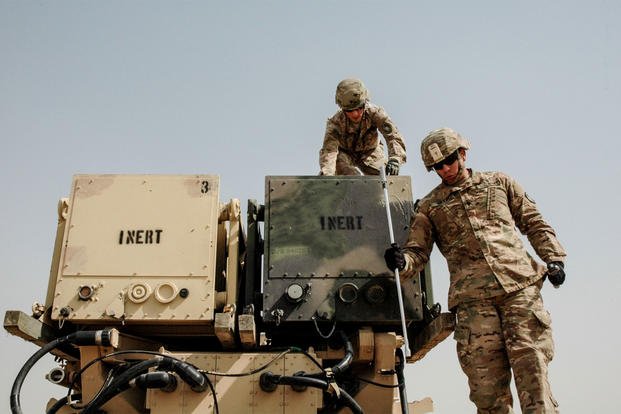A single Patriot air defense battery, backed up by four Sentinel 3D Radars and 200 troops, will deploy to Saudi Arabia in response to attacks that devastated the kingdom's oil production, the Pentagon said Thursday. Those attacks have been blamed on Iran.
In announcing the limited deployment, chief Pentagon spokesman Jonathan Hoffman said Defense Secretary Mark Esper has also put an unspecified number of U.S. troops on "Prepare To Deploy Orders." No decisions have been made on whether they actually will be sent, he added.
Esper is also considering the deployment of two more Patriot batteries and a Terminal High Altitude Area Defense system (THAAD), Hoffman said in a statement.
The initial token deployment "will augment the kingdom's air and missile defense of critical military and civilian infrastructure," and will add to "an already significant presence of U.S. forces in the region," he said.
Related: Attacks on Saudi Oil Plants Reveal Weaknesses in US-Made Defenses
The Sept. 14 attacks by swarms of drones and cruise missiles devastated the huge Abqaiq oil production facility and the nearby Al Khurais oil field, initially knocking out about five million barrels per day of oil production, according to Saudi defense officials.
U.S. Secretary of State Mike Pompeo has repeatedly blamed Iran or its proxies for the attacks, but President Donald Trump appears to have ruled out for the moment a retaliatory strike.
Trump said last week that the U.S. would show "restraint" while focusing on diplomacy and ramping up sanctions on an already heavily sanctioned Iranian economy.
Late last Friday, following meetings with Trump and his national security team at the White House, Esper and Joint Chiefs Chairman Gen. Joseph Dunford said they were planning to bolster Saudi defenses with a limited deployment of assets and troops.
"This follows the secretary and chairman's extensive outreach to partners in the region, and around the globe," Hoffman said Thursday. "It is important to note these steps are a demonstration of our commitment to regional partners, and the security and stability in the Middle East."
The U.S. began building up forces in the region earlier this year in response to what officials called Iranian threats, deploying the carrier Lincoln and its battle group, a B-52 Stratofortress task force, and other assets.
U.S. troops also re-opened the Prince Sultan Air Base in Saudi Arabia's east central desert, which had been in disuse since the 2003 invasion of Iraq. It was not immediately clear whether the additional troops and the Patriot battery will deploy to Prince Sultan.
"Other countries have called out Iranian misadventures in the region, and we look for them to contribute assets in an international effort to reinforce Saudi Arabia's defense," Hoffman said.
There were no immediate signs that allies were responding to the U.S. request.
Iran has denied involvement in the attacks on Saudi Arabia. On Wednesday, Iranian President Hassan Rouhani said his government will not consider negotiations with the U.S. until sanctions are lifted.
"I declare, on behalf of my nation and country, that our response to negotiation under sanction is 'No,'" he said in an address at the United Nations General Assembly in New York.
Rouhani said his country "will never negotiate with an enemy that intends to make Iran surrender by means of the weapon of poverty, pressure and sanction."
-- Richard Sisk can be reached at Richard.Sisk@Military.com.
Read more: The Navy Is Finally Replacing Seahawk Gunner Seats That Cause Back Injuries












